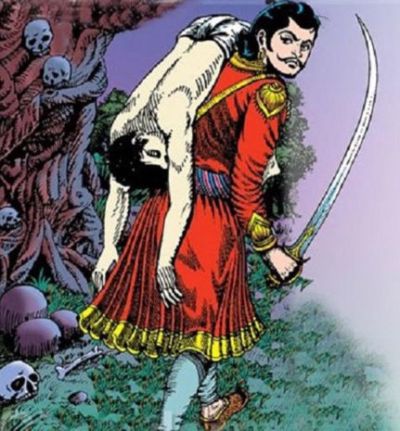And so Jīmūtavāhana, his father and his mother, left that very night and went to the Malaya mountains. They made a small hut near a stream, one that was well-hidden by sandalwood trees, and lived a simple life, making do with whatever they could find, and caring for each other.
In the course of time, Jīmūtavāhana made a friend of the name of Mitrāvasu, the son of Viśvāvasu, the King of the Siddhas, who dwelt on that mountain.

एकदा चात्र स भ्राम्यन् विवेशोपवनस्थितम् ।
द्रष्टुम् आयतनं देव्या गौर्या जीमूतवाहनः ॥ १२,२३.४० ॥
तत्रोपवीणयन्तीं च ददर्श वरकन्यकाम् ।
सखीजनान्वितां शैलतनयाराधनोद्यताम् ॥ १२,२३.४१ ॥
आकर्ण्यमानसंगीतमञ्जुवीणारवां मृगैः ।
दृष्टलोचनलावन्यलज्जितैर् इव निश्चलैः ॥ १२,२३.४२ ॥
दधता तारकं कृष्णम् अर्जुनेन स्वचक्षुषा ।
पाण्डवीयाम् इव चमूं कर्णमूलं विविक्षतीम् ॥ १२,२३.४३ ॥
परःपरविमर्देन मुखेन्दोर् इव दर्शनम् ।
अतृप्ताव् इव वाञ्छन्तौ बिभ्रन्तीं संमुखौ स्तनौ ॥ १२,२३.४४ ॥
धातुर् घटयतो मुष्टिग्रहेणेव निपीडिते ।
वलीमग्नाङ्गुलीमुद्रे मध्ये क्षाममनोरमाम् ॥ १२,२३.४५ ॥
दृष्टया च तया सद्यः सो ऽभूज् जीमूतवाहनः ।
तन्व्या मुषितचित्तो ऽन्तो दृष्टिमार्गप्रविष्टया ॥ १२,२३.४६ ॥
सापि तं भूषितोद्यानं दृष्ट्वोत्कण्ठाविकारदम् ।
कामाङ्गदाहवैराग्याद् वनं मधुम् इवाश्रितम् ॥ १२,२३.४७ ॥
तथानुरागविवशा भेजे कन्या विहस्तताम् ।
यथा सखीव वीणास्या व्याकुलालापतां ययौ ॥ १२,२३.४८ ॥
ततः स पप्रच्छ सखीं तस्या जीमूतवाहनः ।
किं धन्यं नाम सख्यास् ते को वंशो ऽलंकृतो ऽनया ॥ १२,२३.४९ ॥
तच् छ्रुत्वा सा सखी प्राह नाम्ना मलयवत्य् असौ ।
मित्रावसुस्वसा सिद्धराजविश्वावसोः सुता ॥ १२,२३.५० ॥
One day, as Jīmūtavāhana was wandering in the gardens, he saw a temple of Devi Gaurī, and went inside to pray for peace and happiness.
There, he saw a beautiful lady, seated in between her attendants, playing the veena and singing bhajans in praise of the Devi.
She was so melodious that a few deer had gathered outside the temple, listening to the sweet sound of her voice and standing motionless, as if beholding the beauty of her eyes.
दधता तारकं कृष्णम् अर्जुनेन स्वचक्षुषा ।
पाण्डवीयाम् इव चमूं कर्णमूलं विविक्षतीम् ॥ १२,२३.४३ ॥
She moved her black pupils restlessly, and the whites of her eyes seemed to make way for them to the very end, as if penetrating deep into her ears, with the kajal of her eyes helping them in the process, given that they were elongated beyond her eyelids, and touching the tips of the ears…
This is one portion that demonstrates the inadequacies of the English language. The description seems beautiful, but the Sanskrit version has a dual meaning.
It is written in a way that it can be read as an extract of the Mahabhārata, where her pupils, or तारकं (also weapons), were vanquishing the कर्णमूलां (reaching deep into her ears, also the army led by Karna), with the support of कृष्णम् (Sri Krishna, also the dark kajal applied on her eyes).
It is tough to describe, but the beauty of this verse is to be savored. Pause a bit here, and enjoy:)
Her huge breasts seemed to not have had enough glimpses of her face, and so were rubbing against each other in their eagerness to see her moon-like countenance…her thin waist had three lines, as if representing the three fingers of the Deva who had made her while holding her so…
And the moment she entered through his eyes, Jīmūtavāhana felt that she directly reached his heart, and stole it away from him.
She also saw him, the lone beautiful spot in the relatively listless garden, and her heart stirred. She felt as if she was looking at The Deva of Spring, who had been banished to the forest due to KāmaDeva being burnt by Lord Shiva’s third eye…
And so hard she fell in love with him, that her veena, which had been her closest friend, became silent and forlorn.
Then Jīmūtavāhana said to an attendant of hers:
“What is your friend’s name, and what beautiful family is she from?”
The attendant replied…
“She is the sister of Mitrāvasu, and the daughter of Viśvāvasu, the King of the Siddhas, and her name is Malayavatī.”
to be continued…
